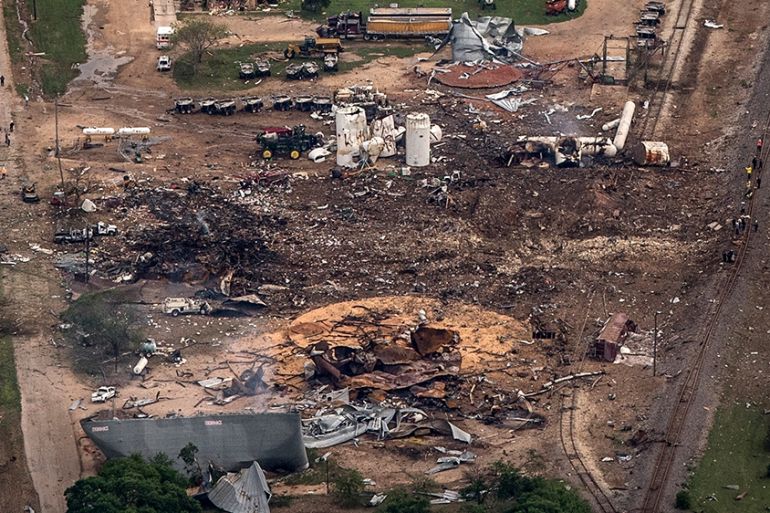Beirut blast: In a small Texas town, echoes of Lebanon’s tragedy
The town of West was partly levelled in 2013 by a similar blast; today, its mayor feels no lessons have been learned.

The shocking videos coming out of the Lebanese capital are grimly familiar to Tommy Muska as he sits thousands of miles away in the US state of Texas: a towering blast, a thundering explosion, and shock waves demolishing buildings with horrifying speed.
The mayor of West, Texas, lived through the same thing seven years ago when one of the deadliest fertiliser plant explosions in US history partly levelled his rural town. Muska has a feeling that, yet again, no lessons will be learned from this tragedy.
Keep reading
list of 4 itemsParallel seasons: How Lebanon hides from reality
Lebanon’s FIBA World Cup journey is about much more than basketball
Justice for the Beirut blast can help avert Lebanon’s collapse
“I don’t know what people were thinking about storing that stuff,” Muska, a volunteer firefighter at the time of the West explosion, told The AP news agency.
The 2013 disaster at the West Fertilizer Company was a fraction of the size of Tuesday’s explosion at Beirut’s port. Authorities say the Beirut explosion killed at least 137 people and wounded about 5,000.
Both blasts involved massive stockpiles of ammonium nitrate, a common but highly explosive chemical, and swift allegations that negligence and weak government oversight were to blame.
Few significant crackdowns on chemical storage came in the wake of the West explosion, which killed 15 people. Late last year, US President Donald Trump scaled back industrial safety and disaster regulations enacted in direct response to the West tragedy.

In Beirut, the investigation into Tuesday’s blast is focusing on how a reported 2,750 tonnes of ammonium nitrate came to be stored at the facility for six years and why nothing was done about it.
The chemical had been stored at the city’s port warehouse since it was confiscated from a ship in 2013. On Tuesday, it is believed to have detonated when a fire started nearby.
‘We don’t seem to learn’
In West, the authorities suspected arson, but no arrests were made. The explosion had the force of a small earthquake, flattening homes within a five-block radius and destroying a nursing home and leaving its residents, some in wheelchairs, trapped in the rubble. Ten of those killed in the blast were firefighters or first responders.
“We don’t seem to learn that that chemical is deadly,” Muska said. “I feel for those people in Beirut, I surely do. It brought back a lot of memories.”
Among the stipulations in the Chemical Disaster Rule (CDR) scaled back by the Trump administration was a requirement that plants provide information about chemical risks to the public.
The Obama-era CDR is one of several regulations meant to lessen the risks of major industrial disasters that experts say have been weakened under Trump. The regulations included safety facilities to prevent disasters such as the one that struck the nuclear plant in Fukushima, Japan.
The Environmental Protection Agency, which has trimmed scores of environmental and public health protections that the Trump administration sees as unfriendly to business, did not immediately respond to a request for comment about the rollback.
Elena Craft, a Texas-based senior director with the Environmental Defense Fund, cited the CDR among a series of other proposals weakening protections for communities – often lower-income, and disproportionately Black or Hispanic – living around dangerous industrial sites.
Even the West disaster, with its toll on first responders, failed to change the regulatory picture much after the headlines faded away, Craft said. “It’s always been sort of the constant story … it gets to be accepted business in Texas.”
|
|
Six major blasts since March 2019
In 1989, Juan Flores was in the sixth grade when an explosion at a Phillips 66 plastics plant near Galena Park, Texas, outside of Houston killed 23. The blast shook Flores’s school and blew out windows.
That area bordering Houston’s Shipping Channel is the nation’s hub for oil and gas and petrochemicals.
Yet Houston’s lack of zoning means the yards of residents’ homes in poorer and minority neighbourhoods often butt up against looming chemical and petroleum storage tanks or industrial sites working with hazardous materials.
Six major chemical explosions have rocked the Houston area since March 2019 alone.
“To see that happen” in Beirut, it was the “worst-case scenario for already worried people” in his community, said Flores, a community activist and former Galena Park mayor. “There’s one or two plants here. If they ever go, there’s a chance we could wind up in that situation.”
In West, street images on Google Maps still show photos of crumpled buildings that were taken shortly after the blast that shook the town of 3,000.
But ammonium nitrate is not stored in the town any longer. “It’s got its useful places in the farming community,” Muska said. “But it’s also, like we saw yesterday, it can just be devastating.”